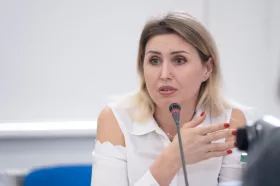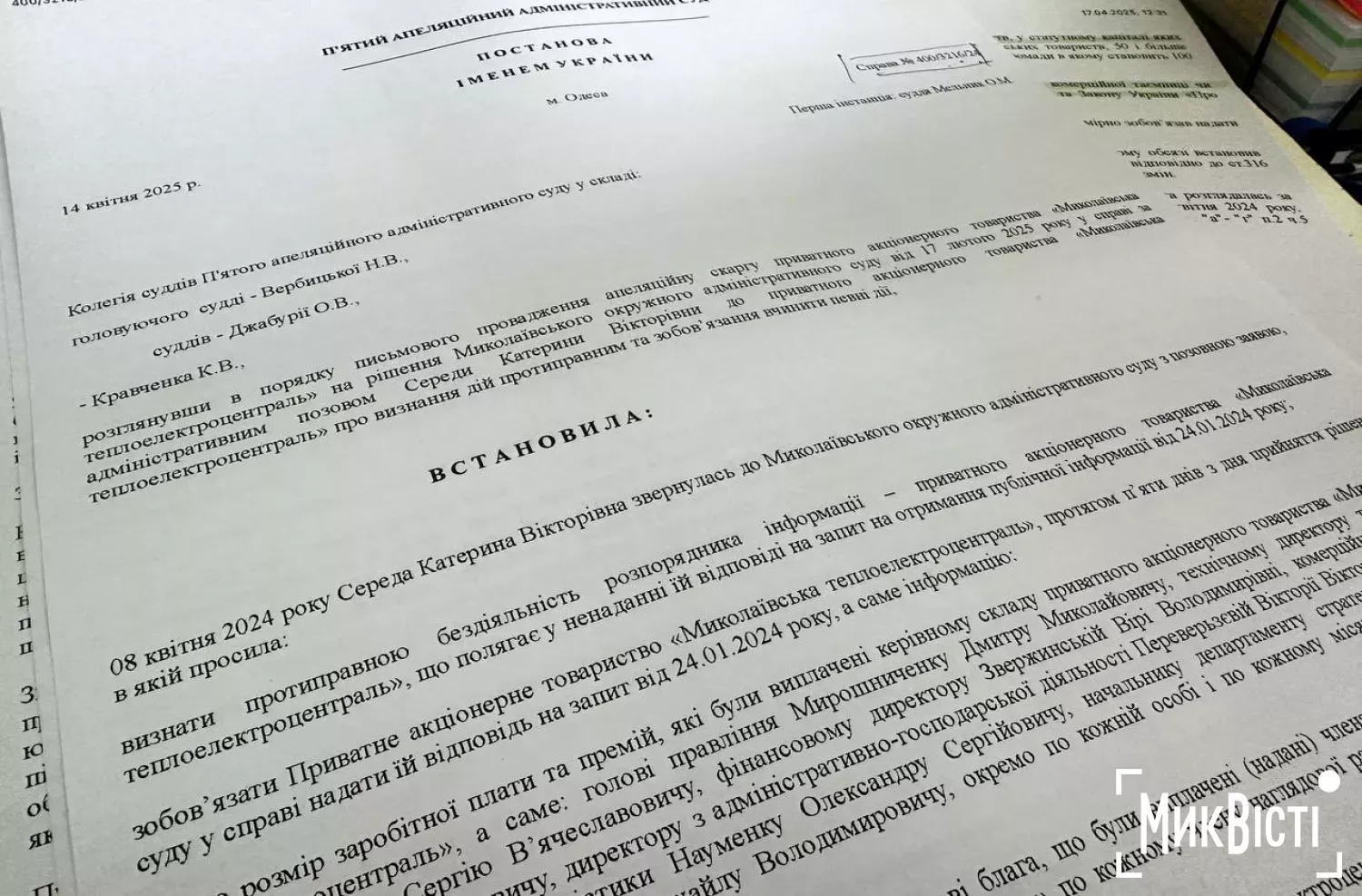Mykolaiv TPP loses appeal and must now disclose salaries of management and supervisory board
- Kateryna Sereda
-
•
-
18:20, 17 April, 2025
Mykolaiv CHPP lost an appeal to the online media NikVesti in the case of providing public information on the amount of salaries and bonuses paid to the company's management and supervisory board members in 2023.
On 14 April, the Fifth Administrative Court of Appeal considered CHPP's appeal and dismissed it.
More than a year ago, on 24 January 2024, the journalist sent an information request to the company, asking for information about the salaries and bonuses received by the management of Mykolaiv CHP in 2023. A separate item of the request was information on the amount of remuneration, reimbursement of expenses and additional benefits provided to members of the Supervisory Board of the Private Joint Stock Company «Mykolaiv Combined Heat and Power Plant». In May 2024, the publication filed a lawsuit to oblige the CHPP to publish salary data. On 17 February, the Mykolaiv District Administrative Court fully upheld the lawsuit filed by the editor-in-chief of NikVesti Kateryna Sereda against the Mykolaiv CHP plant.
In its appeal, Mykolaiv CHP referred to the court's incorrect application of substantive law and the inconsistency of the court's conclusions with the circumstances of the case and asked to overturn the decision of the Mykolaiv District Administrative Court and adopt a new one, dismissing the claims. Mykolaiv CHP stressed that despite the fact that 100% of the company's shares are owned by the state, the company is a private law entity.
Interestingly, three months ago, the company's director, Dmytro Myroshnychenko, commenting on the consequences of the shelling of Mykolaiv TPP for «News.LIVE», stated that Mykolaiv TPP is a fully state-owned company and therefore has the right to claim budget funds and use the existing infrastructure built many years ago at the expense of the state.
«As for Mykolaiv CHP, it is a fully state-owned company. The charter states that it is a private joint-stock company, but it is a joint-stock company — 99% of the shares belong to the «Naftogaz Ukraine group», which means that through Naftogaz we report directly to the Cabinet of Ministers and the state. Of course, that is why the state helps us through various funds to restore our energy component to provide residents with heat,» explained Dmytro Myroshnychenko on 28 January this year on Novosti.LIVE, a recording of which was published on the company's Facebook page.
In court, the company referred to the charter, according to which the chairman of the board is obliged not to disclose information that constitutes an official or commercial secret.
However, the Court of Appeal disagreed with the arguments of Mykolaiv CHP's representatives. In addition, the panel of judges examined the company's orders submitted to the court, which approved the list of information classified as confidential and constituting a trade secret. According to these orders of Mykolaiv CHP, the commercial secret includes, among other things, information on the salaries of employees, the terms of the contract with the chairman and members of the supervisory board, grades and salary schemes for determining the amount of remuneration of the company's employees. However, the court found that the CHP's reference to the classification of the requested information as a trade secret or confidential information contravened the requirements of the Law of Ukraine «On Access to Public Information» and the Law «On Information».
 In the photo: Mykhailo Talpa (Head of Strategic Development Department), Viktoriia Pereverieva (Director of Administrative and Business Operations) and Dmytro Myroshnychenko (Chairman of the Board of Mykolaiv CHP), photo by Mykolaiv CHP
In the photo: Mykhailo Talpa (Head of Strategic Development Department), Viktoriia Pereverieva (Director of Administrative and Business Operations) and Dmytro Myroshnychenko (Chairman of the Board of Mykolaiv CHP), photo by Mykolaiv CHPAs a result, the court upheld the decision of the Mykolaiv District Administrative Court and ordered Mykolaiv CHP to provide all requested information on the salaries and remuneration of the company's management and supervisory board. The court ruling came into force on 14 April.
Kateryna Sereda's interests as a plaintiff were represented in court by Oksana Maksymeniuk, a lawyer and head of the legal department at the Institute for Regional Press Development.
In a commentary to NikVesti, Oksana Maksymeniuk said that this case is a vivid example of the fact that the information manager tried to deny the legal receipt of public open information.
 Oksana Maksymeniuk, lawyer, lawyer at the Institute for Regional Press Development (IRPD) Photo: prostir.ua
Oksana Maksymeniuk, lawyer, lawyer at the Institute for Regional Press Development (IRPD) Photo: prostir.ua«The Court of Appeal clearly established this and stressed that information that must be provided by law cannot be withheld. The legislator has clearly stated that this information cannot be restricted,»said Oksana Maksymeniuk.
According to her, with the onset of the coronavirus epidemic and during the full-scale war, cases of public information holders refusing to provide public information have become more frequent.
«As soon as the administrator has the opportunity to refer to the impossibility of providing public information, in particular due to military operations, he does so. The trend in court decisions on access is in favour of journalists where there is a genuine failure to provide information. If the request is properly drafted, and the holder of the information really has it, and he does not provide it for formal reasons, such as martial law, then we win the case,» said Oksana Maksymeniuk.
As you know, Dmytro Myroshnychenko, director of the Mykolaiv Combined Heat and Power Plant (CHP), indicated in his property and income declaration for 2024 that he earned 2.3 million hryvnias last year. On average, this is 193,000 hryvnias per month, which is 18,000 hryvnias more than the previous year.
